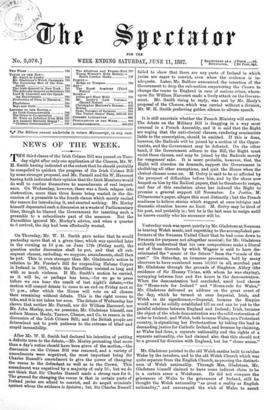Yesterday week was spent quietly by Mr. Gladstone at Swansea
in hearing Welsh music, and regretting to the accomplished per- formers of the Swansea United. Choir that he had come down to Swansea for purposes not altogether musical; for Mr. Gladstone evidently understood that his own compositions make a liberal use of those discords by which Wagner is said to have dis- criminated the "music of the future" from the "music of the past." On Saturday, an immense procession, held by many observers to have numbered some 50,000 in all, marched past Mr. Gladstone through the grounds of Singleton Abbey (the residence of Sir Hussey Vivian, with whom he was staying), occupying between four and five hours in the demonstration. When the demonstration had concluded, amid loud cheers for "Home-rule for Ireland" and "Home-rule for Wales," Mr. Gladstone delivered an address on the great event of the day, which he termed at once Imperial, Irish, and Welsh in its significance,—Imperial, because the Empire would never be solidly established till an end can be put to the painful relations between England and Ireland; Irish, because the object of the whole demonstration was the solid restoration of order in Ireland; and Welsh, both because Wales, as a Protestant country, is signalising her Protestantism by taking the lead in demanding justice for Catholic Ireland, and because by claiming, as Wales had done, a separate nationality and the rights of a separate nationality, she had claimed also that this should not be a ground for disunion with England, but for "closer union."


































